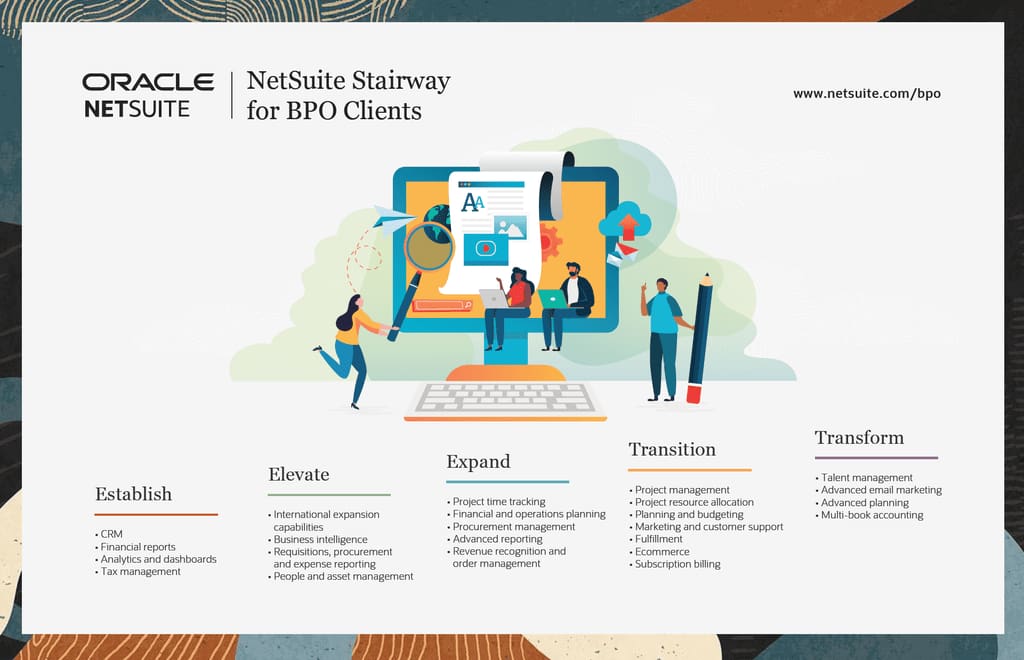Enterprise Resource Planning (ERP) systems are incredibly powerful tools that can help organizations grow by providing a real-time, integrated view into core financials. But getting started can be daunting. Whether you’re migrating to a full-featured ERP like NetSuite from a more basic system like QuickBooks or looking to replace a collection of specialized products and spreadsheets, many back-office operations will need to adapt. Your accounting team, whether staff or third-party bookkeepers, will likely have a knowledge gap that can make moving to a new, more powerful system like NetSuite a challenge.
In fact, there’s one question financial leaders often ask when hesitating to make a much-needed ERP transition: “How do I get the expert resources on the migration team to make the project a success?”
One answer is a business process outsourcing, or BPO, provider that can handle all aspects of the implementation, even act as your finance team, freeing staff for other important projects and innovations. An expert partner really pays off by ensuring your accounting and finance functions operate smoothly, not only during this technological transformation but post-go-live as well.
When you choose the right expert, not only is an ERP transition feasible, you can also simplify operations, decrease overhead and scale more easily post-launch.
Is My Company a Candidate?
High-growth, early-stage companies that have yet to build out their internal finance teams and expanding mid-market firms are particularly good candidates for the BPO-enabled route to a full NetSuite implementation. For example, a software provider that needs to scale quickly but that’s stuck on QuickBooks can readily sublicense NetSuite through a BPO provider, like ScaleNorth (opens in new tab), for a quick and cost-effective upgrade.
Let’s look at how the business model works.
BPO is the act of using a third-party for one or more core business functions. NetSuite BPO partners offer basic bookkeeping, fractional CFOs and controllers, audit support, monthly closes and more on the NetSuite accounting platform. These providers can work with businesses with revenue ranging from pre-revenue startups to $500 million and more. Their staff members are well-versed in the provider’s platform of choice and are able to help companies get up and running fast.
Removing Barriers: BPO as a Migration Strategy
By forging a partnership with a BPO, you can knock down many of the barriers to entry that come with an ERP migration. Any company that’s still using basic systems like QuickBooks, manual processes or spreadsheets can reap the rewards of outsourcing while laying the foundation for a successful future financial strategy.
“Having a partner that can stand you up on NetSuite while also keeping your operations running and the machine going at full speed while you make that switch is extremely important,” said Joe Rovirosa, managing director at NetSuite BPO partner ScaleNorth.
Rovirosa outlines a few strategies businesses can choose from:
- Partner to manage accounting on your legacy system, then continue the accounting relationship during the migration and post-go-live on NetSuite.
- Access a cost-effective sublicensing structure along with BPO.
- Launch a traditional NetSuite implementation while your team keeps legacy systems going, then embrace a BPO relationship post-go-live to outsource accounting functions.
Let’s explore these options in more depth.
Pre- and post-migration BPO. With this strategy, your BPO provider’s accounting professionals start work in your existing accounting platform before the migration to NetSuite begins. They may handle anything from monthly closes and reconciliations all the way up to fractional controller services during this period.
Equally important, they will analyze your existing business workflows and finance/accounting practices to gain a deep understanding of how your business operates. This will not only assist with tailoring NetSuite to your business needs when the time comes, but they’ll be able to provide consultative advice on how to improve or optimize your financial strategy based on their broad experience.
When the implementation requirements gathering process begins, the BPO provider’s experts will serve on your team, bringing to bear a deep understanding of your business strategy, model and finance practices. They’ll point the implementation team in the right direction on key initiatives and requirements.
“This strategy allows your business to ‘get ahead’ of a NetSuite implementation by utilizing a phased approach that results in a seamless transition between the two platforms,” said Dani Sandler, CPA, head of BPO accounting for ScaleNorth.
Traditional NetSuite implementations. NetSuite Solutions Providers like ScaleNorth are equipped to handle the sale of NetSuite, then implement and optimize it for your business. When your organization is ready to use NetSuite for all of its finance and accounting functions, the provider’s CPAs can take over some or all needed tasks.
There are a number of reasons this approach could make sense for your organization: You gain full access to and control over the world’s leading cloud-based ERP system. The licenses are yours, and you can set the system up to best suit your needs, within the parameters of NetSuite’s licensing agreements.
When the implementation is complete, you may choose to train existing staff on NetSuite or hire new team members who are already well-versed on the platform. Or, you can exercise a BPO relationship, in which you’ll have access to a team of third-party accounting and finance professionals to run your operations. Businesses typically find that a BPO relationship costs the same or less than hiring, provides more flexibility for companies with seasonal or cyclical fluctuations, decreases overhead and provides for easier scalability.
NetSuite sublicensing program: With sublicensing, you gain access to a NetSuite instance that is sublicensed through the BPO provider. This path delivers the full power of NetSuite at a lower price point. Providers can offer services on top of the license you’ve purchased, but they can also purchase the license on your behalf. That has some cost benefits and can mitigate certain risks inherent in buying a new ERP system but also limits your operational usage in some ways. If the provider initially purchases the license on your behalf, you always have the option of taking ownership of the license at any point with no need to re-implement. It’s important to note, however, that there are no administrator credentials issued. Instead, the NetSuite instance is administered by the BPO, with your team having access to any needed functionalities.
As with the traditional method, once the sublicensed instance is tailored to your business, the BPO may provide outsourced accounting.There are some key differences between these two strategies, though:
- Traditional licensing is best for organizations that have the resources to run their own NetSuite instances or want full operational use of the system.
- A sublicensing approach is more cost-effective, as it’s less expensive to sublicense an existing NetSuite instance than it is to purchase your own. The sub-licensing arrangement works particularly well when companies are big fans of outsourcing and keeping lean internal staffs.
Whether your company decides to license NetSuite on its own or take advantage of a sublicensing arrangement, the partner offers transitional talent for accounting and implementation.

NetSuite with BPO: Best of Both Worlds
Regardless of your licensing strategy, the goal of an ERP implementation is to come out on the other side a more agile, efficient and profitable organization. Finding a cost-effective and flexible way to do this is challenging, but the powerful combination of new software and an enhanced finance and accounting team makes business transformation achievable.
By unleashing the full power of NetSuite, your organization will enjoy more efficient operations, improved automation and visibility and effortless scalability. When you pair that kind of power with an outsourced team of highly certified finance professionals, total transformation comes easily.
Ready to make the case? Let’s look at six key benefits of a BPO-enabled migration strategy.
1. Decreased overhead. The goal of any organizational change should be to maximize revenue and improve operations. Implementing NetSuite is one of the most powerful, high-ROI projects your company can undertake. If you’re looking to squeeze every dollar out of your investment, adding a team of outsourced accounting and finance professionals to your organization will help you accomplish that. Apart from saving money on hiring and training, benefits and office space, you pay for only the services you need.
2. Smooth scalability, fewer fluctuations. Whether you need more help at monthly, quarterly or year-end peaks; are prone to seasonal fluctuations; or are simply growing quickly, having the exact right internal staff can be difficult to plan for. Hire too many accountants, and you’re stuck paying their salaries and overhead during lulls. Hire too few, and you get overworked employees who are prone to burnout. By outsourcing your accounting operations, staff can be added or removed with ease, allowing for cost savings and improved operations.
3. NetSuite-focused experts. A NetSuite partner’s accountants are singularly focused on NetSuite; often, they are CPAs and hold advanced NetSuite certifications. This makes them incredibly efficient on the platform, oftentimes able to handle the workload of two or more internal employees.
4. Fewer barriers to entry. Migrating to a new system is filled with unknowns, which can keep many decision-makers on the sidelines until growth becomes unmanageable or they fall so far behind more nimble competitors that the business fails. The BPO option removes these risks. Knowing that your finances will be properly run and managed both during and after the implementation reduces the “fear factor.”
5. Pre-migration staging. If you have gaps or pain points in your accounting processes, it’s important to understand how they will be addressed so problems aren’t transferred into NetSuite. Ensure that your chosen BPO partner has CPAs and accountants who can work inside QuickBooks or your legacy accounting system before the migration begins to:
- Close open periods and financial transactions.
- Analyze your current processes.
- Confirm everything is optimized for the switch to NetSuite.
- Gain knowledge that will help make the NetSuite implementation smoother and more efficient, leading to more ROI from the project.
6. Improved reporting & visibility. Not only do BPO employees have years of progressive NetSuite finance experience, they’re experts in customizing and automating the platform. Apart from gaining access to their advanced accounting knowledge, you’ll enjoy detailed reports, dashboards, forecasts and more.
Bottom Line
Partnering with a BPO provider goes a long way to mitigate the risks associated with large ERP projects and helps keep your business on track even as you move from a very rudimentary system to an advanced platform like NetSuite.
Recently, for example, ScaleNorth worked with a $75 million company that received significant venture backing but didn’t have enough accounting staff or resources to manage a migration to NetSuite. The company entered into a BPO relationship with ScaleNorth, which is implementing NetSuite and full licenses.
“The whole process happens pretty quickly, regardless of whether you’re doing a full NetSuite implementation or using sublicensing along with BPO to aid in the transition,” said Rovirosa. By leveraging the strengths of a firm that specializes in accounting outsourcing, your organization can save time, money and headaches.
Ready to let a professional services firm take these tasks off of your to-do list?
Learn more about A Pathway to NetSuite Migration (opens in new tab)
Interested in helping other companies grow with NetSuite?
Learn more about becoming a NetSuite BPO partner




